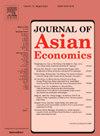Optimizing public expenditure for knowledge-based growth: Evidence from provincial data in Vietnam
IF 2.9
3区 经济学
Q1 ECONOMICS
引用次数: 0
Abstract
Purpose
This study examines the impact of public expenditure on science, technology, and education on provincial economic growth in Vietnam from 2002 to 2015. It explores how fiscal spending composition influences growth, with a focus on regional disparities and shifts across different economic reform periods.
Design/methodology/approach
The research employs the system GMM estimator to control endogeneity and unobserved heterogeneity, analyzing panel data from all 63 provinces in Vietnam. It analyses renovation periods (2002–2007 and 2008–2015) and compares the effectiveness of fiscal spending between Northern and Southern provinces.
Findings
The results show that public expenditure on science, technology, and education significantly drives provincial economic growth, particularly during the later reform period (2008–2015). Regional analysis reveals divergent impacts: Northern provinces benefit more from education spending, while science and technology investments yield stronger growth effects in Southern provinces. Development investment consistently supports growth, whereas recurrent expenditure shows limited productivity.
Research limitations/implications
This study is constrained to a 13-year period and a single-country context. Future research could extend the analysis to other developing economies or longer timelines to capture broader analysis.
Practical implications
The findings offer actionable insights for policymakers in Vietnam and other developing countries. Recommendations include reallocating fiscal resources toward knowledge-based investments, prioritizing education spending in Northern regions, and boosting science and technology funding in the South. Enhancing the share of development-oriented expenditure over recurrent spending is critical for achieving sustainable economic growth.
Originality/value
This paper provides a pioneering empirical analysis of optimizing public expenditure for knowledge-based growth at the provincial level in Vietnam, bridging gaps in the literature on fiscal policy and regional economic disparities in developing economies.
优化公共支出促进知识型增长:来自越南省级数据的证据
本研究考察2002 - 2015年越南科技教育公共支出对省级经济增长的影响。它探讨了财政支出构成如何影响经济增长,重点关注地区差异和不同经济改革时期的变化。本研究采用系统GMM估计器来控制内生性和未观察到的异质性,分析了越南所有63个省的面板数据。它分析了改革时期(2002-2007年和2008-2015年),并比较了北方和南方省份之间财政支出的有效性。研究结果表明,公共科技教育支出对省级经济增长的拉动作用显著,特别是在改革后期(2008-2015年)。区域分析显示,北方省份的教育支出受益更多,而南方省份的科技投资增长效应更强。发展投资一贯支持增长,而经常支出显示出有限的生产力。研究局限性/意义本研究限于13年的时间和单一国家的背景。未来的研究可以将分析扩展到其他发展中经济体或更长的时间线,以获得更广泛的分析。实际意义研究结果为越南和其他发展中国家的决策者提供了可行的见解。建议包括将财政资源重新分配给以知识为基础的投资,优先考虑北方地区的教育支出,以及增加南方地区的科学和技术资金。提高面向发展的开支占经常开支的比例对于实现可持续的经济增长至关重要。原创性/价值本文对优化越南省级公共支出以促进知识型增长进行了开创性的实证分析,弥合了有关发展中经济体财政政策和区域经济差异的文献差距。
本文章由计算机程序翻译,如有差异,请以英文原文为准。
求助全文
约1分钟内获得全文
求助全文
来源期刊

Journal of Asian Economics
ECONOMICS-
CiteScore
4.70
自引率
9.40%
发文量
90
期刊介绍:
The Journal of Asian Economics provides a forum for publication of increasingly growing research in Asian economic studies and a unique forum for continental Asian economic studies with focus on (i) special studies in adaptive innovation paradigms in Asian economic regimes, (ii) studies relative to unique dimensions of Asian economic development paradigm, as they are investigated by researchers, (iii) comparative studies of development paradigms in other developing continents, Latin America and Africa, (iv) the emerging new pattern of comparative advantages between Asian countries and the United States and North America.
 求助内容:
求助内容: 应助结果提醒方式:
应助结果提醒方式:


